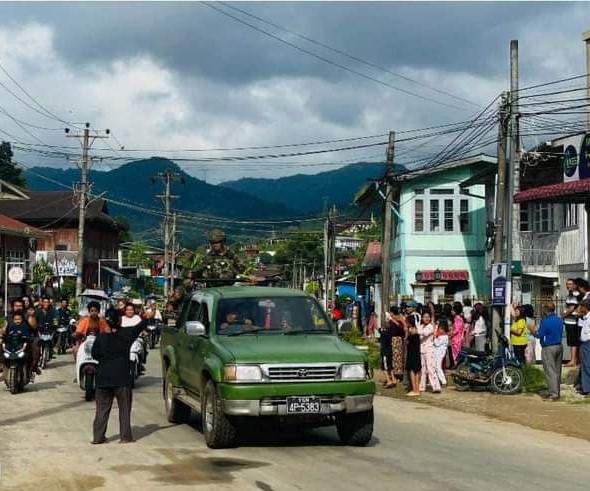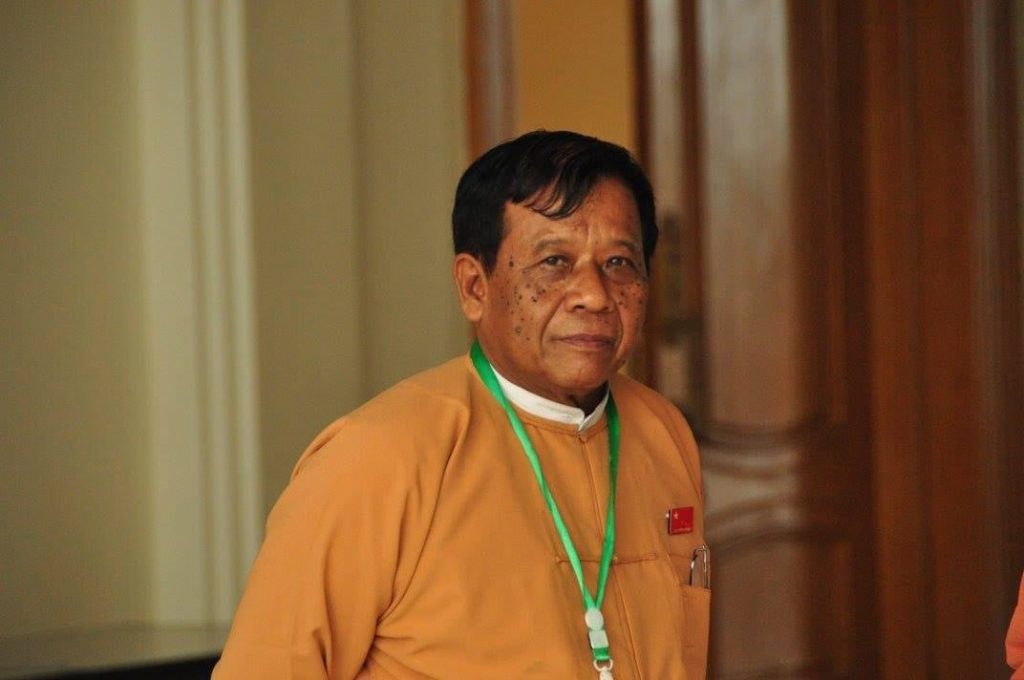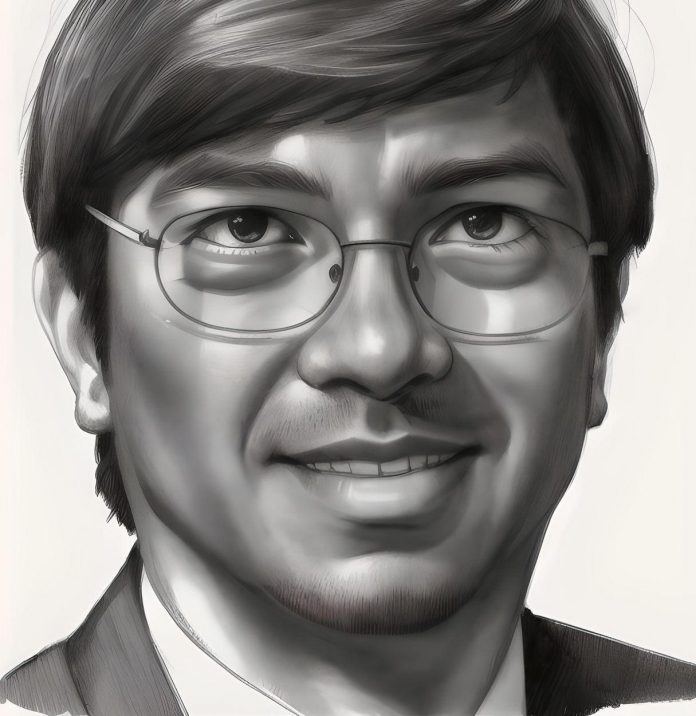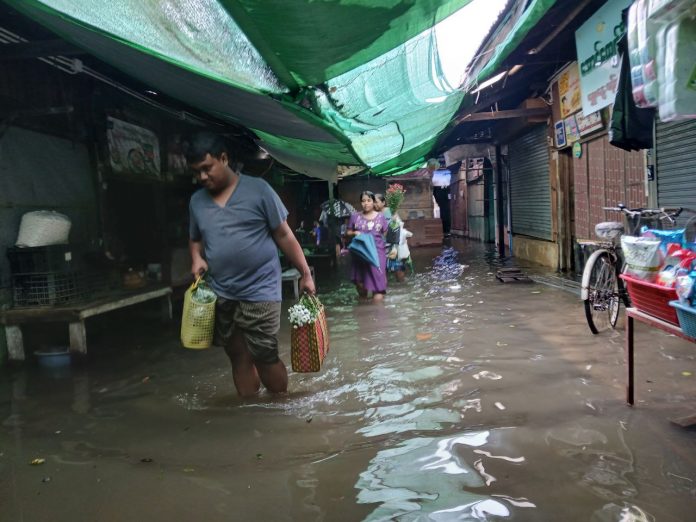The Brotherhood Alliance, which consists of the Myanmar National Democratic Alliance Army (MNDAA), the Ta’ang National Liberation Army (TNLA), and the Arakan Army (AA), launched Operation 1027 in northern Shan State one year ago, on Oct. 27, 2023.
Resistance forces nationwide, including ethnic armed groups and the People’s Defense Force (PDF), have made sweeping gains since then, seizing control of 85 towns across Myanmar, according to DVB data.
They are contesting another 74 other towns currently under the military regime. Naypyidaw maintains stable control of only 98 towns and cities.
“Operation 1027 at the end of October 2023 dramatically shifted the conflict dynamics in Myanmar, resulting in a string of humiliating defeats for the Myanmar military and putting it on the back foot across much of the country,” said Richard Horsey, the senior Myanmar advisor at International Crisis Group (ICG).
During the first phase of Operation 1027, the TNLA seized control of seven towns in northern Shan State. This includes the entire Palaung Self-Administered Zone, which consists of Namhsan and Mantong townships, as well as the China-Myanmar border town Namhkam.
The MNDAA also captured seven towns, including the border towns of Chinshwehaw, Mongkoe, and Pansai. It seized control of Laukkai, its former headquarters and capital of the Kokang Self-Administered Zone, on Jan. 4.
The Brotherhood Alliance captured Hopang and Panglong in the Wa Self-Administered Division, before handing control over to the United Wa State Army (UWSA).
A ceasefire brokered by Beijing between the Brotherhood Alliance and the military brought a temporary truce to end the fighting in northern Shan State on Jan. 11.
But this was short-lived, with the Brotherhood Alliance and PDF launching a joint offensive in northern Shan State and Mandalay Region the week of June 25 to July 3. Resistance groups declared it the beginning of the second phase of Operation 1027.
Seven towns have been captured by the TNLA since June, including Mogok in Mandalay Region. It is famed for its ruby mines, which are a major source of revenue for both the military and ethnic armed groups active in neighboring Shan State.
Resistance forces led by the MNDAA achieved their biggest victory since the 2021 coup when they took full control of Lashio, the largest city in northern Shan State, after seizing the Northeastern Regional Military Command (RMC) headquarters on Aug. 3. This was the first time the military has lost control of an RMC in Myanmar’s history.
The Brotherhood Alliance and the PDF now control almost the entire highway linking Myanmar’s second largest city Mandalay to China, which is a vital trade route between the two countries. Resistance forces have now turned their eyes to Mandalay itself, with the PDF controlling four towns in Mandalay Region.
The AA launched a separate offensive in Arakan State and southern Chinland on Nov. 13, 2023. It has made rapid gains on the battlefield, seizing full control of 10 out of Arakan’s 17 townships, including Buthidaung Township along the Myanmar-Bangladesh border.
It has also taken control of Paletwa Township in southern Chinland, one of the major terminals of the Kaladan Multimodal Transit Transport Project (KMTTP), a $484 million USD Indian-backed investment project that seeks to connect India to the Arakan State capital, Sittwe.
The AA is now closing in on the Western RMC headquarters in Ann Township, which is located around 199 miles (320 km) southeast of Sittwe. This would be the second RMC lost to the Brotherhood Alliance, and would allow resistance forces to penetrate deeper into Magway Region.
“The Arakan Army has now seized most of the state, along with parts of neighbouring Chin State, and controls large stretches of the border with Bangladesh and India,” said Thomas Kean, the ICG Senior Consultant on Myanmar and Bangladesh.
“It could soon capture the regime’s regional command at Ann, which would be a huge blow to the regime, and a strategic and political boost for the ethnic armed group,” added Kean.
Chin resistance forces have also triumphed over the military by capturing 12 towns in Chinland, including the Myanmar-India border town of Rihkhawdar. The military now only maintains battalion-level positions in Hakha, Thantlang, Tedim, Falam, and Mindat towns.
The Kachin Independence Army (KIA) has seized 12 towns since it launched its offensive in Kachin State on March 7, including the towns of Loije and Pangwa along the Myanmar-China border. Pangwa is located within the Kachin Special Region 1, a hub for the country’s rare earth mining industry.
Karenni resistance forces claim to control six towns in Karenni State, including Mese on the Myanmar-Thailand border, as well as Demoso in southern Shan State, since it launched an offensive on Nov. 11, 2023. They had also seized most of the Karenni State capital Loikaw during the offensive, but the military was able to regain control of the town in June.
In Karen State, resistance forces led by the Karen National Liberation Army (KNLA) have taken control of the towns of Laykaykaw, Thingyannyinaung, Kyaikdon, Sukali, and Hpapun.
The “Operation Aung Zeya” counteroffensive was launched by the military against KNLA-led forces but it has been unsuccessful in re-establishing full control of Myawaddy Township, the vital trade hub on the border with Thailand.
In Sagaing Region, the PDF and other resistance groups have captured five towns since the start of Operation 1027. This includes Pinlebu, which sits on a road that links Sagaing with Kachin State. The PDF also occupies Tagaung Taung mine, a China-backed nickel mine that is located near the boundary of Mandalay and Sagaing regions.
In the last 12 months, the military has lost around 80 battalions and headquarters, as well as hundreds of other positions. DVB data states that 48 headquarters and battalions have been captured, including one RMC, one Regional Operations Command, and two Operations Command Headquarters in northern Shan State.
Despite the major successes made by resistance groups, the escalation of fighting across Myanmar since the launch of Operation 1027 has had a devastating impact on civilians.
At least 17,136 people have been killed due to armed conflict in Myanmar over the last year, according to data obtained from the Armed Conflict Location and Event Data (ACLED) project.
The independent research group Nyan Lynn Thit Analytica has documented that at least 1,044 civilians have been killed and 1,383 others have been injured since July.
The military has intensified its airstrikes, with the Institute for Strategy and Policy – Myanmar (ISP Myanmar), documenting that over 3,000 were carried out by the Myanmar Air Force between November 2023 and April 2024. At least 452 airstrikes have reportedly occurred nationwide between July and September.
Human rights groups also claim that the persecuted Rohingya have been targeted by the military and the AA during fighting for control of northern Arakan’s Maungdaw and Buthidaung townships since May.
“Senior General Min Aung Hlaing’s leadership and the durability of his regime is now in serious question, but he appears determined to fight to the last, and continues targeting civilians in an attempt to increase the cost of resistance. The humanitarian consequences continue to be grave,” added Horsey.










